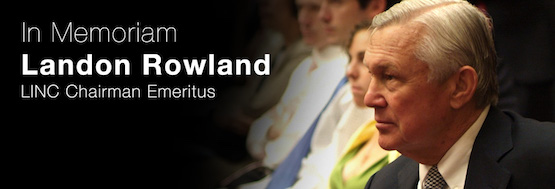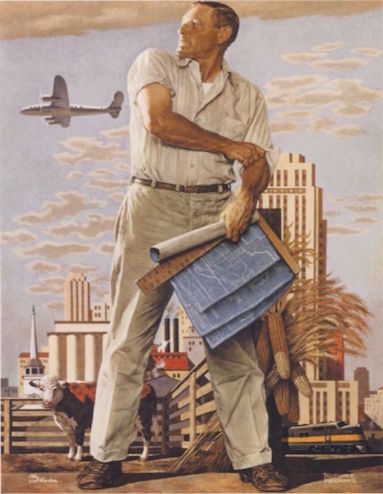 Two months ago one of the most interesting people in Kansas City was laid to rest after a funeral “fit for a field marshall” (in the words of Alec Guiness from the 1959 classic “Tunes of Glory”)…
Two months ago one of the most interesting people in Kansas City was laid to rest after a funeral “fit for a field marshall” (in the words of Alec Guiness from the 1959 classic “Tunes of Glory”)…
The life of Landon Hill Rowland was an extraordinary one so it was only right that his passing should be marked with an appropriate ceremony.
The memorial service at Grace and Holy Cathedral for Rowland on January 8th was standing room only, with over 1,200 people in attendance. This was not surprising, since in the 53 years since Rowland came here as a young lawyer he’d had friends throughout the entire Kansas City community.
Starting as a brilliant court room lawyer, at the old Watson, Ess, Marshall & Enggas law firm, Rowland made many contacts in the business and professional worlds before becoming a top executive at Kansas City Southern. Under his direction, the company diversified, moving into a number of different fields, including data processing and mutual funds. There was many a slip and set-back along the way, including a hostile takeover attempt by George Soros and a multi-billion dollar anti-trust verdict, which could have destroyed the business if it had not been overturned on appeal.
Throughout the entire quarter century Rowland ran Kansas City Southern Industries, he showed not only grace under pressure in difficult times but vision and imagination about the business’s potential when the sailing was smooth.
Anyone who was associated with Rowland for any length of time would agree that it was his ingenuity in tackling challenges that was his most striking trait.
 In the thorough obit in the Kansas City Star, most of Landon Rowland’s significant achievements in his business and philanthropic career were chronicled. Having grown up poor, Rowland had more than a theoretical understanding of what it was like to be poor with little chance to better one’s self.
In the thorough obit in the Kansas City Star, most of Landon Rowland’s significant achievements in his business and philanthropic career were chronicled. Having grown up poor, Rowland had more than a theoretical understanding of what it was like to be poor with little chance to better one’s self.
With the same avidness he pursued his legal and corporate careers,he worked tirelessly to serve every part of the local population, be they the elderly, veterans, racial minorities, or countless others whom he felt had been left out of life’s opportunities.
Rowland also applied his time, focus, and money to improve the quality of life in Kansas City in ways that benefitted the entire community. He and his wife Sarah’s generosity to the Nelson Atkins Museum, where they “upped the game” of the American art collection immeasurably, would by itself be enough to add them to the pantheon of this town’s Immortals. When combined with all the other local performing arts they supported, their record is unmatched in the history of this town.
One aspect of Rowland’s career which no one seems to have mentioned is their involvement with the New York Review of Books, the country’s foremost literary journal. Landon and his wife helped sponsor a number of conferences, featuring world class academics and scholars, dealing with contemporary issues under the aegis of the NYRB and its affiliate foundation. These were here held in London, Oxford and New York and Landon and Sarah were both in attendance and active participants in these events. Landon even had the well known British historian and economist Robert Skidelsky serve on the K.C.S.I. Board of Directors, after getting to know him after an exchange about John Maynard Keynes!
I think it would be fair to say that Rowland not only embodied all that was best in the Kansas City spirit but projected that spirit onto the national and international stages.
I was privileged to know Rowland and his family for 40 years. Last year I told him about a quotation from the late Hugh Kenner, my favorite critic. Kenner was talking about the tradition of “the Renaissance man,” the individual who could turn his hand at any pursuit and master it. He said; “The ideal of the Renaissance virtuoso was a kind of dream that has been a part of the American imagination since the continent was discovered.
Such an individual has the sheer energy of his dreams, coupled with the capacity to believe in himself. His life consisted of an unbroken series of successful gestures, reflecting an infinite capacity to believe in life’s possibilities. He was wealthy enough not to worry about where the money was coming from. But the money was not an end, but only an opportunity, a condition of freedom. This meant the freedom for living up to the resources of the human imagination, as tradition has told you what those resources are.” I realize now that this passage applied to Rowland, as he apparently did too since he had me write it out from a tape-recorded lecture from 1974 and send him a transcript! We will not see his likes again.










met him several times at benefits. And yes…his charitable contributions from
himself and his company were huge!
Nice recognition, Dwight.
Fine work, Dwight!
Wonderful remembrance! You are lucky to have known such a legend.